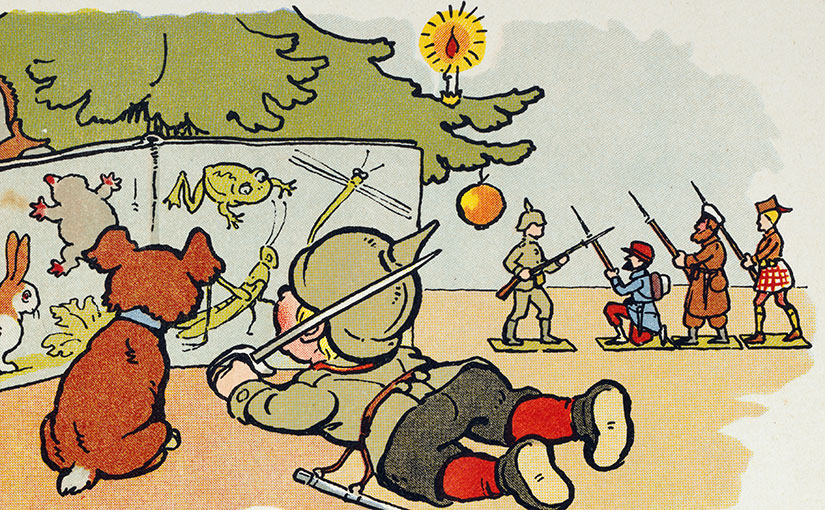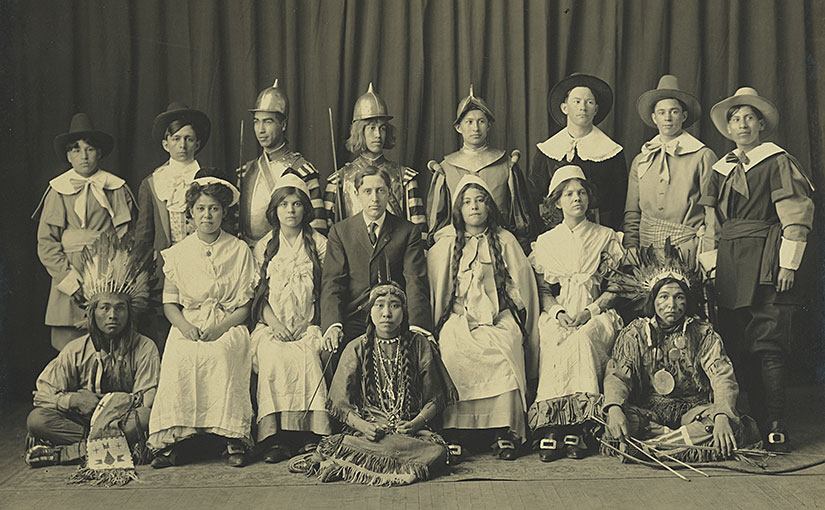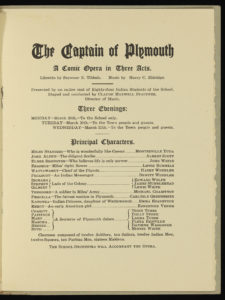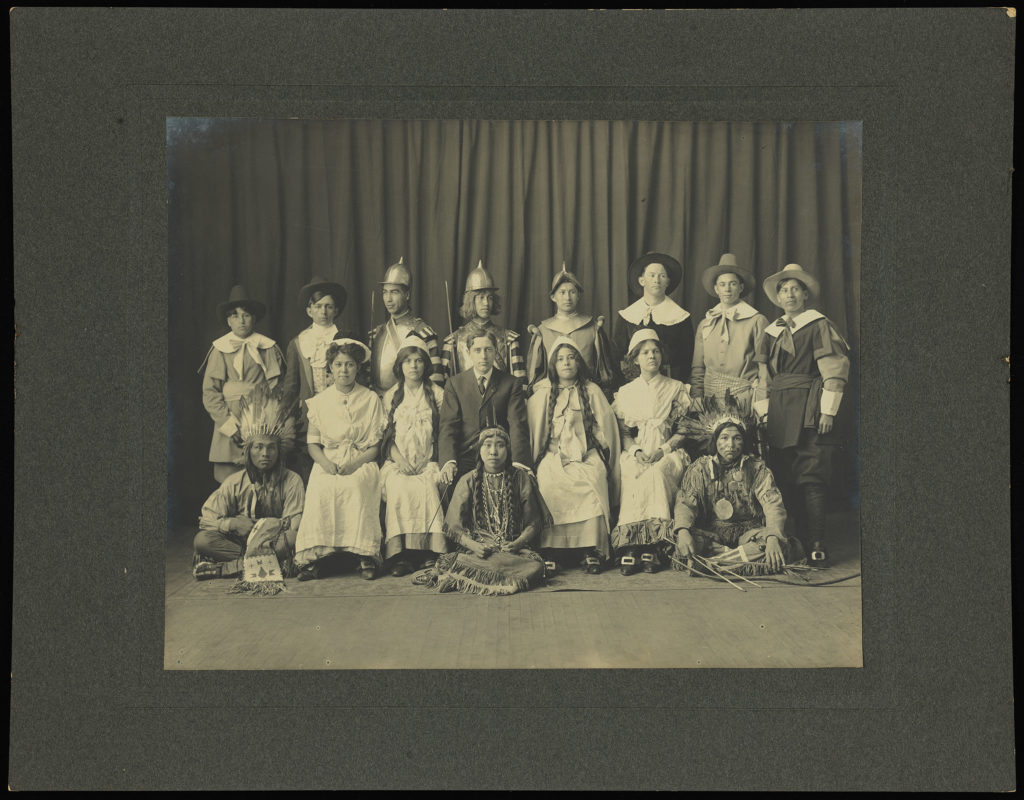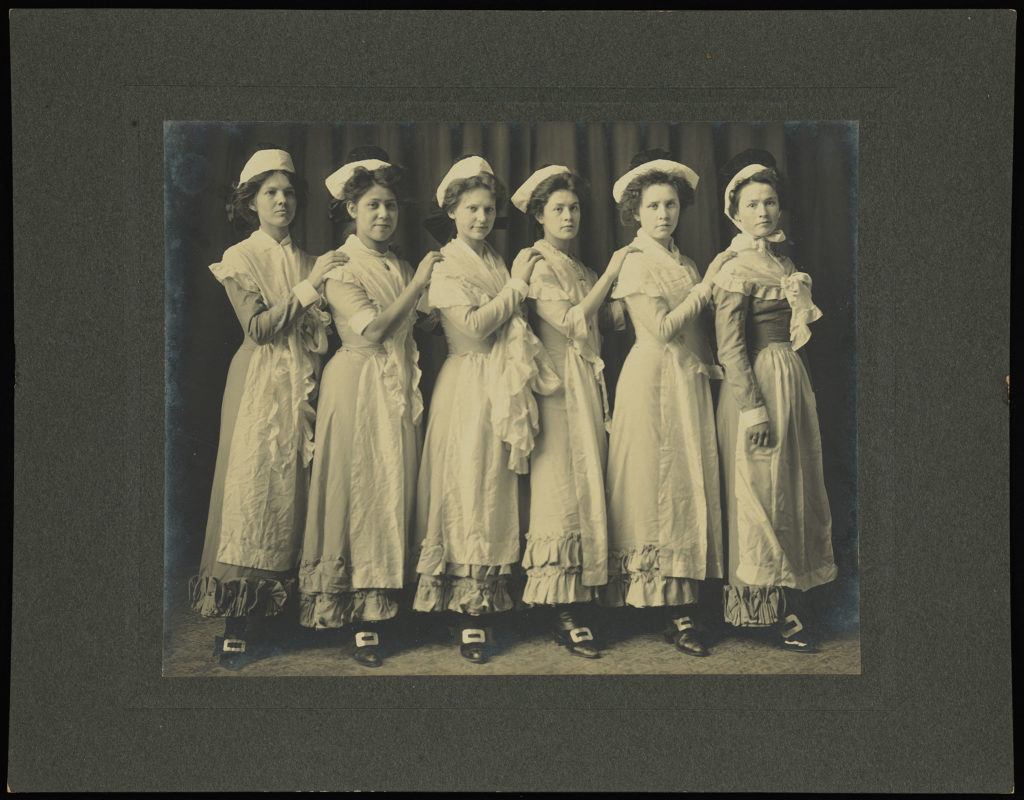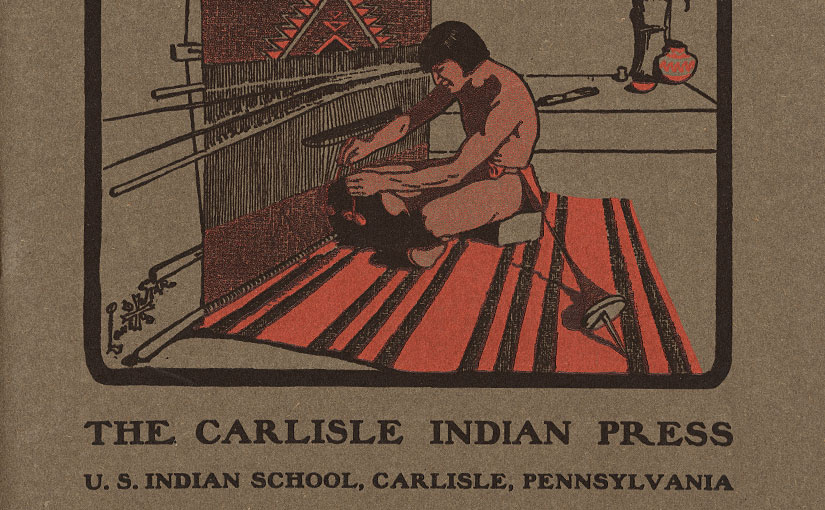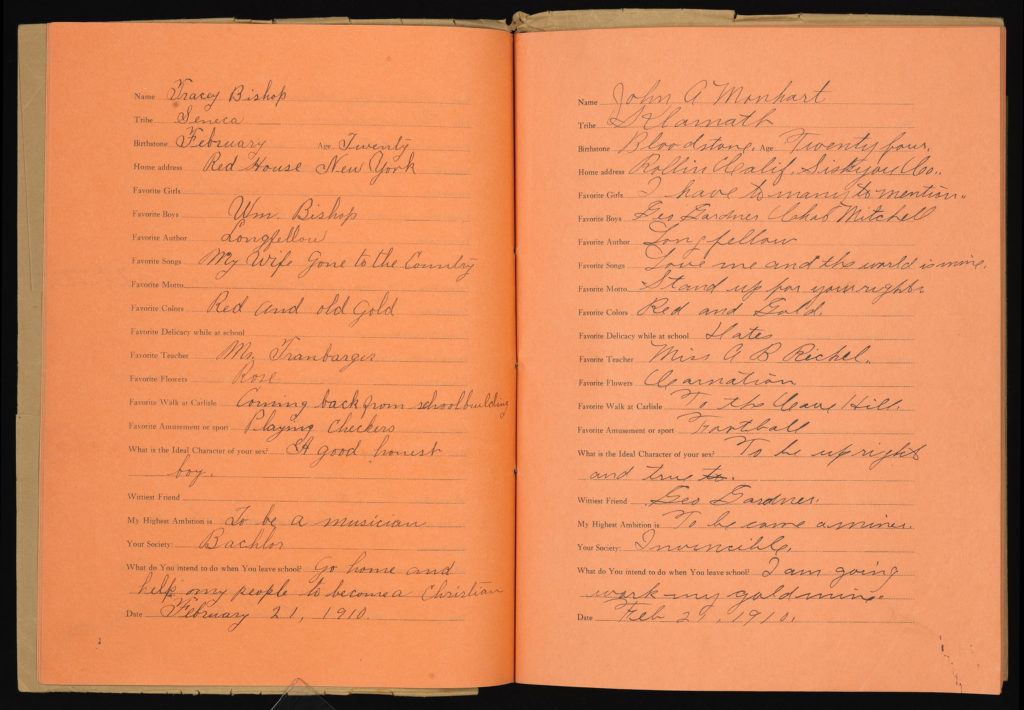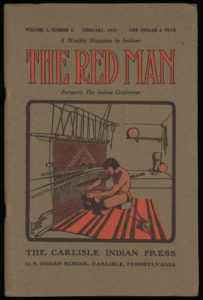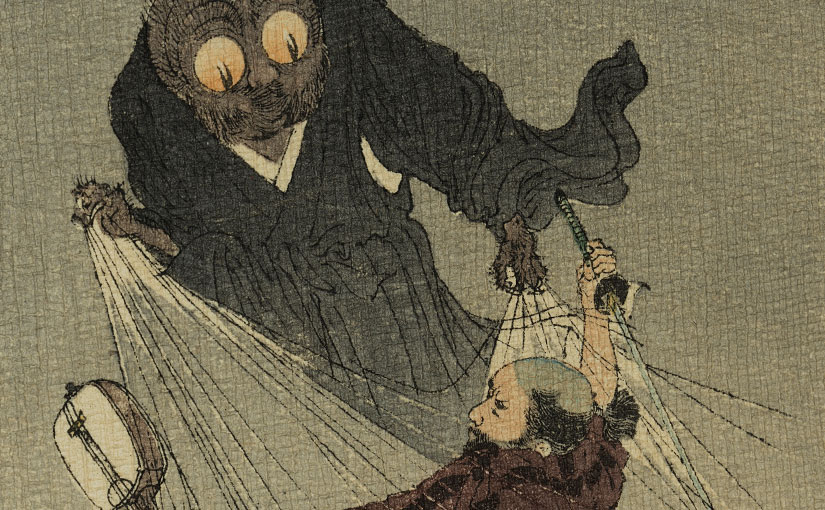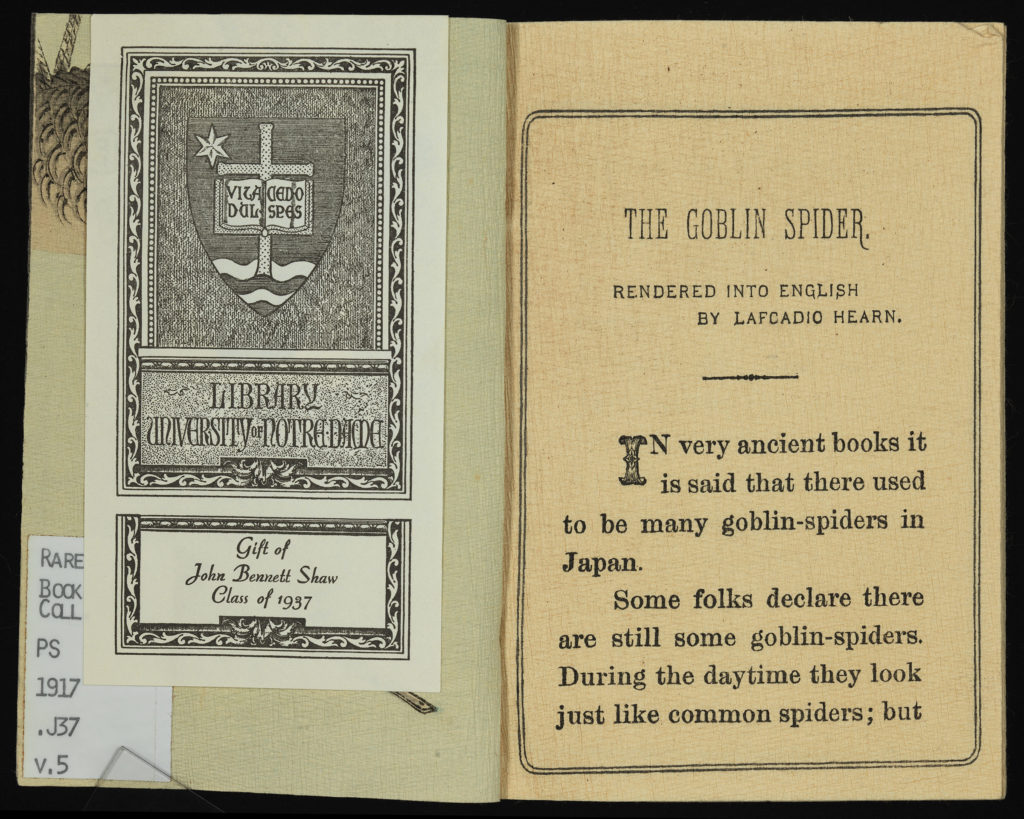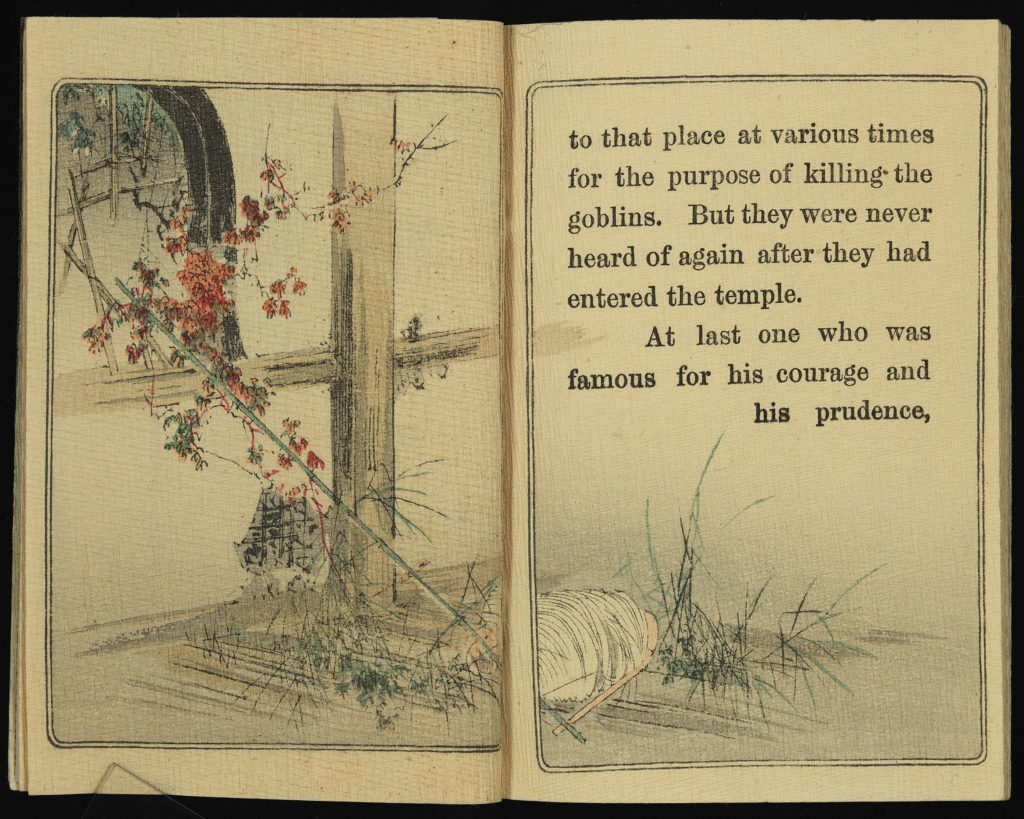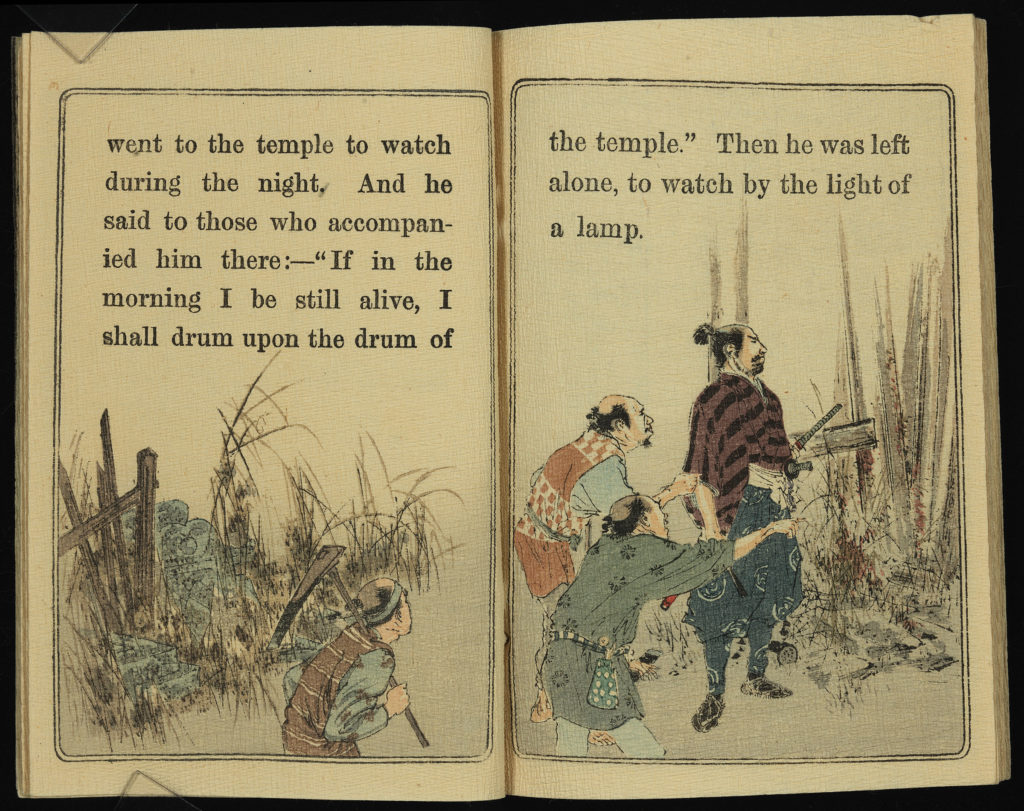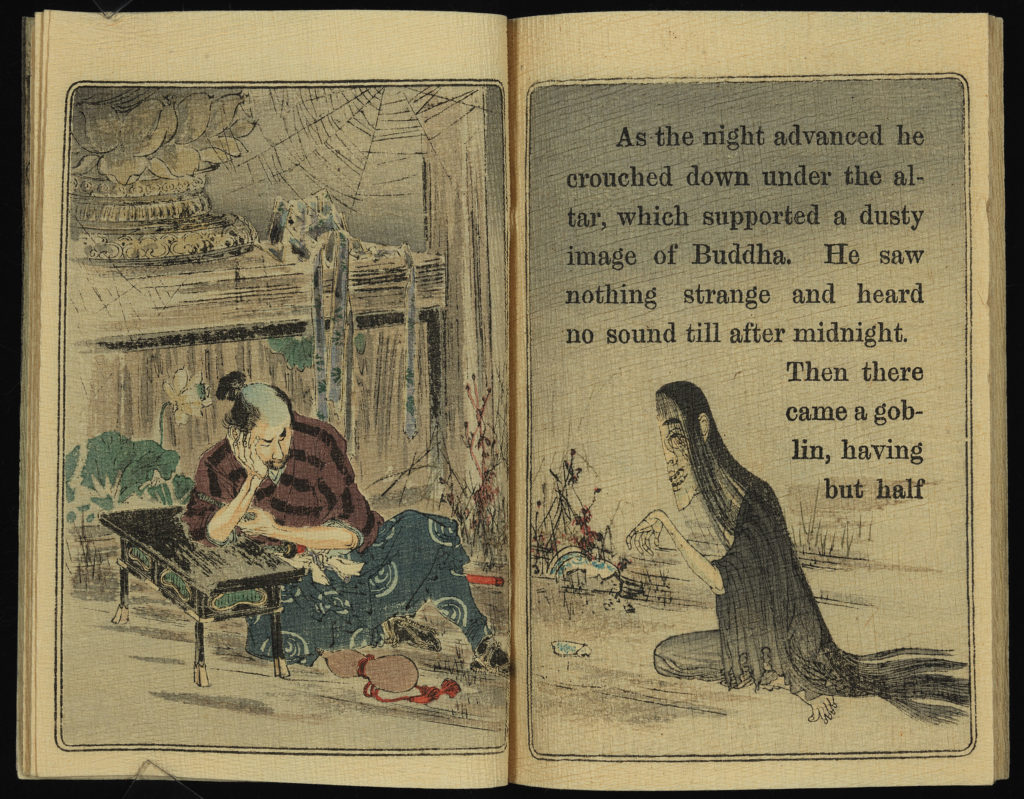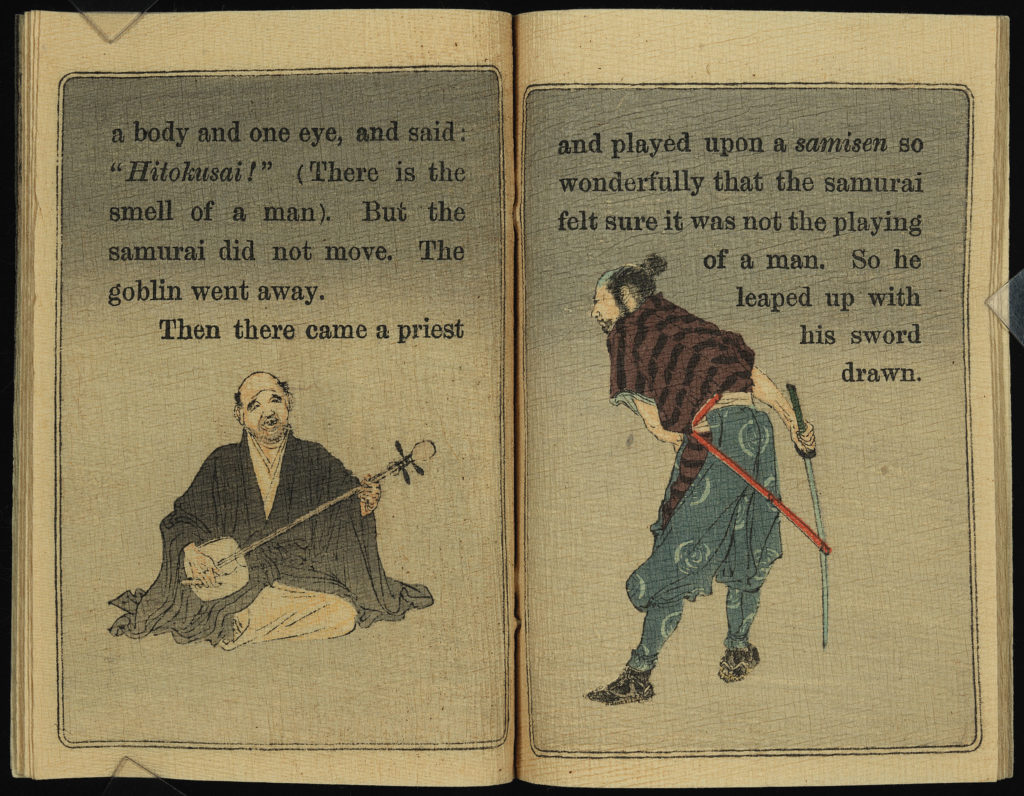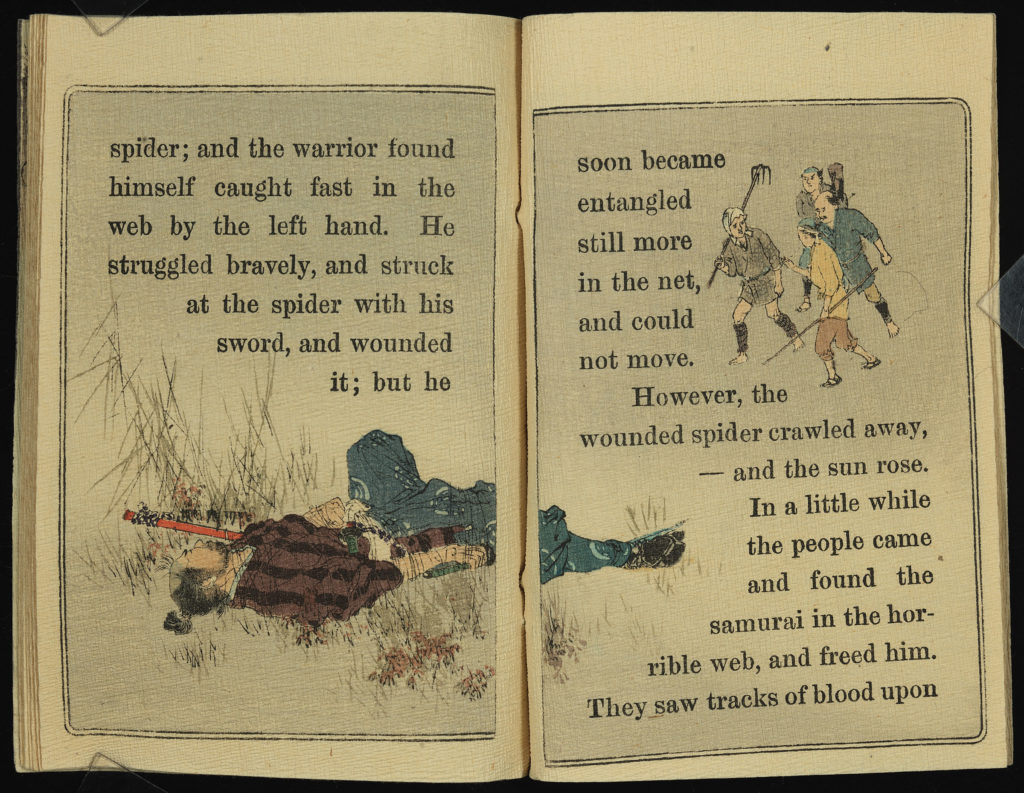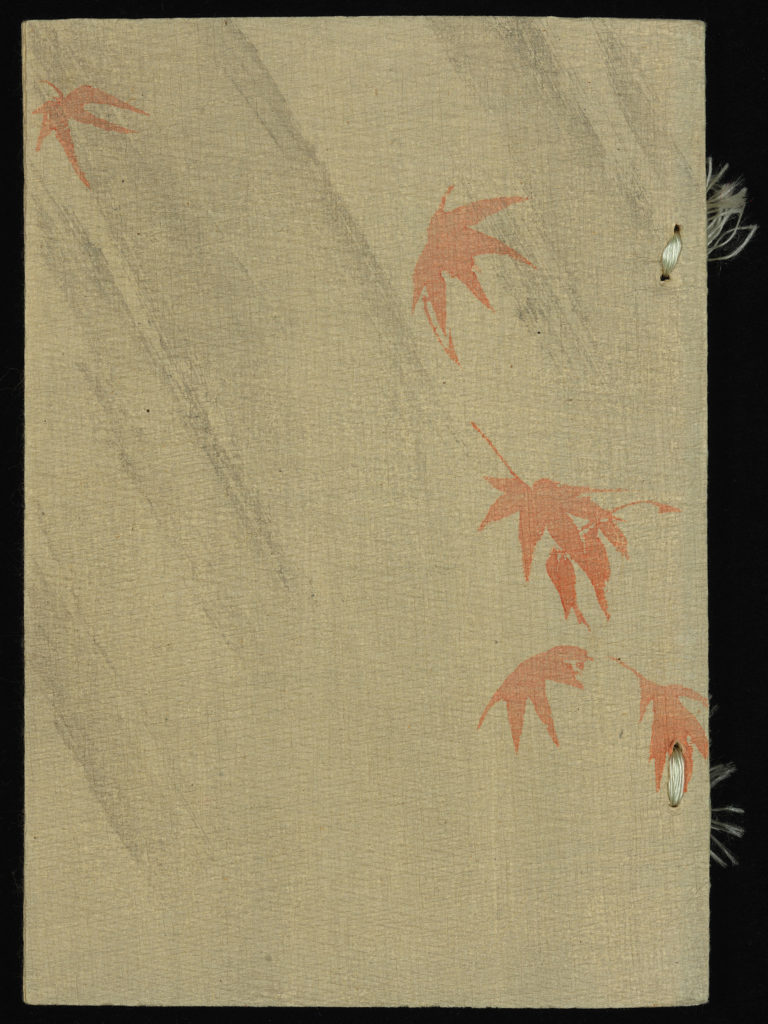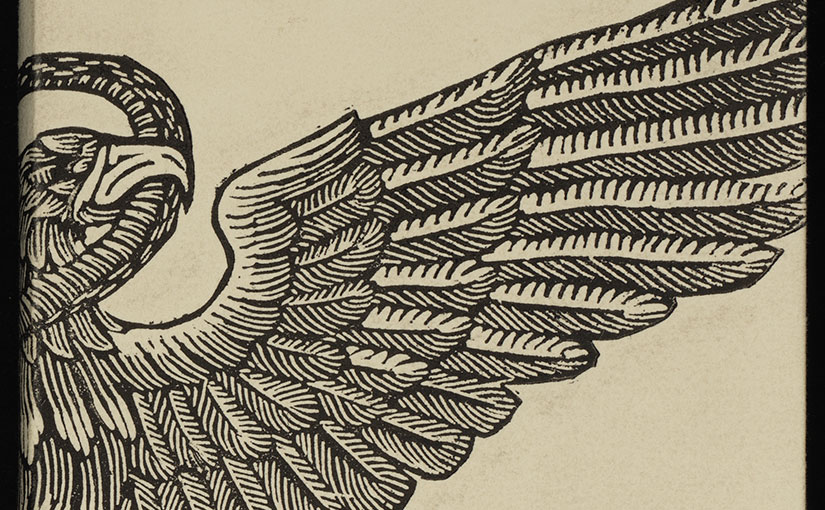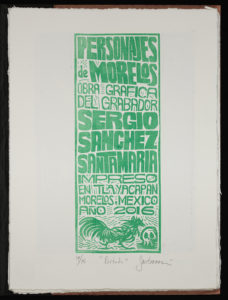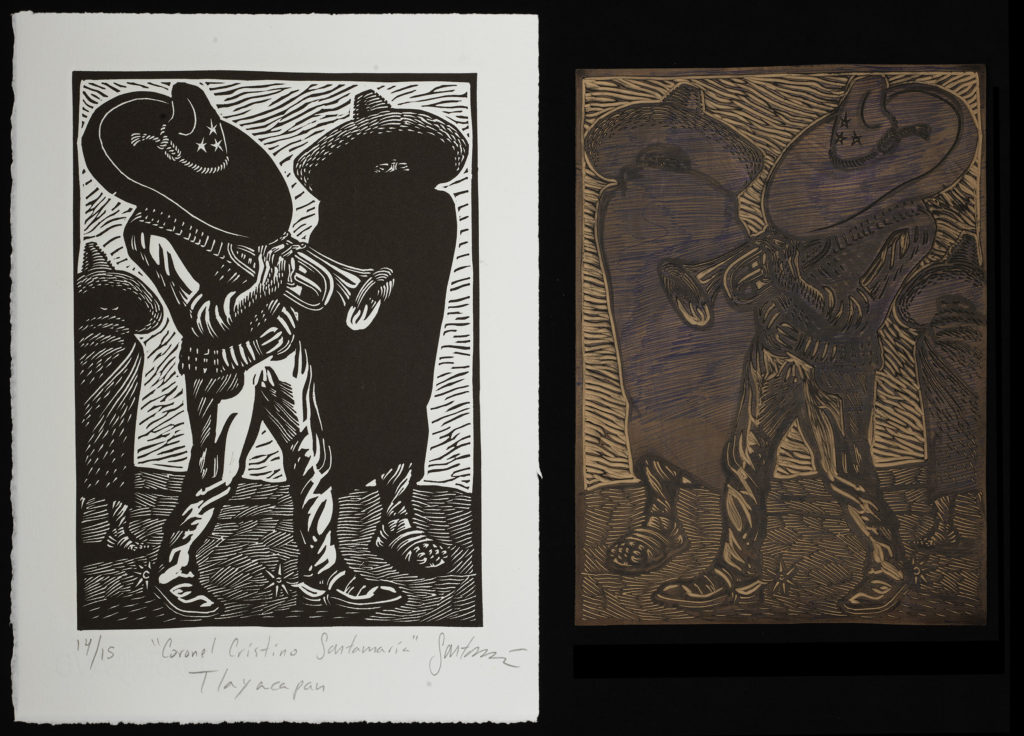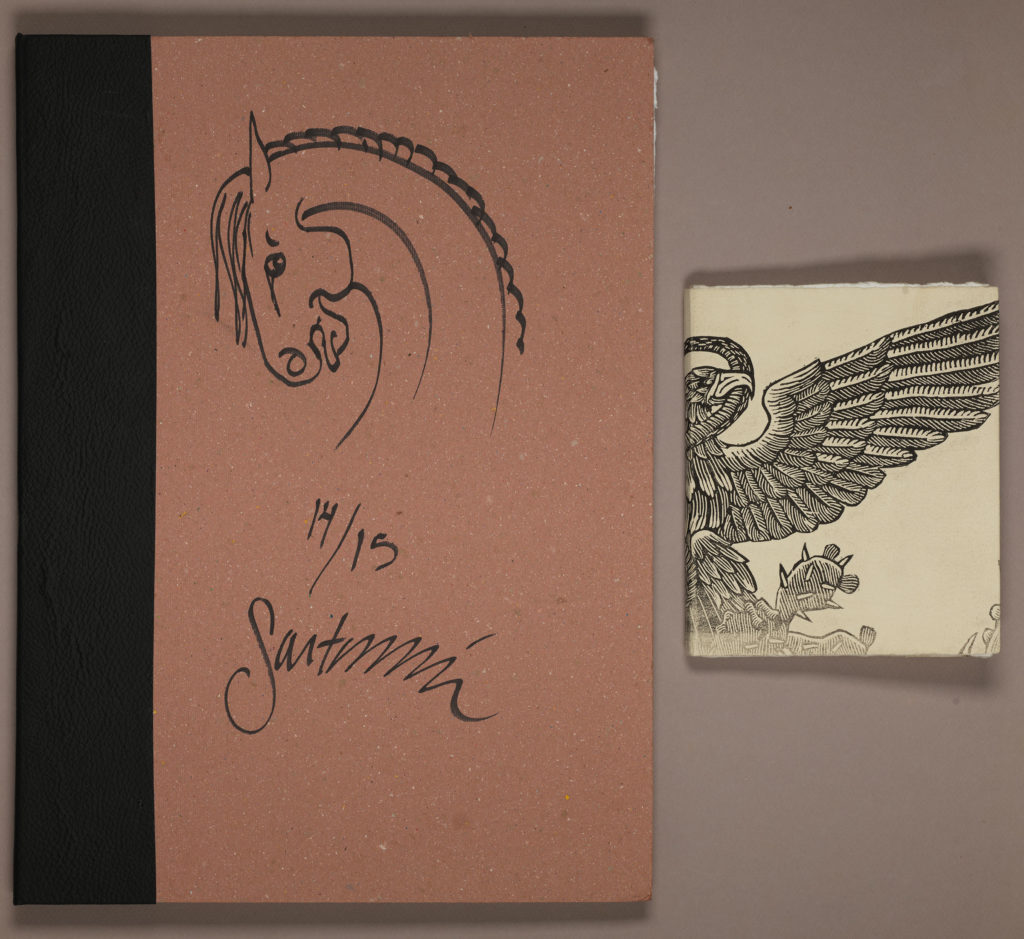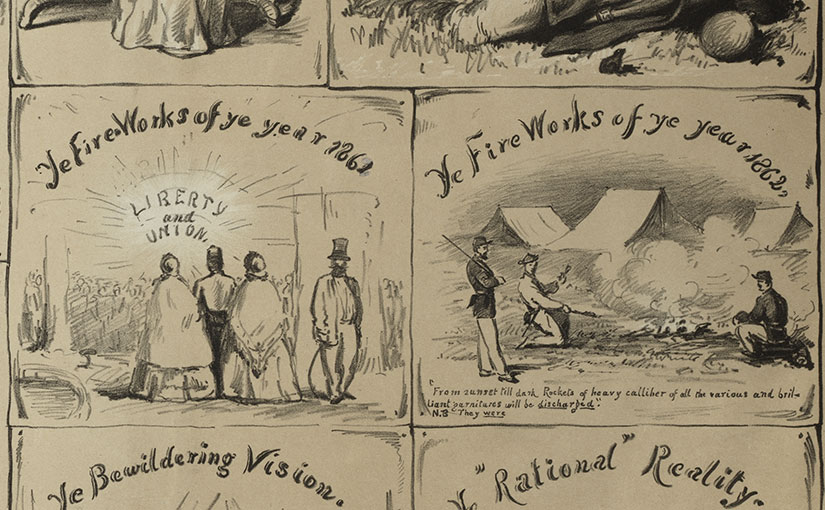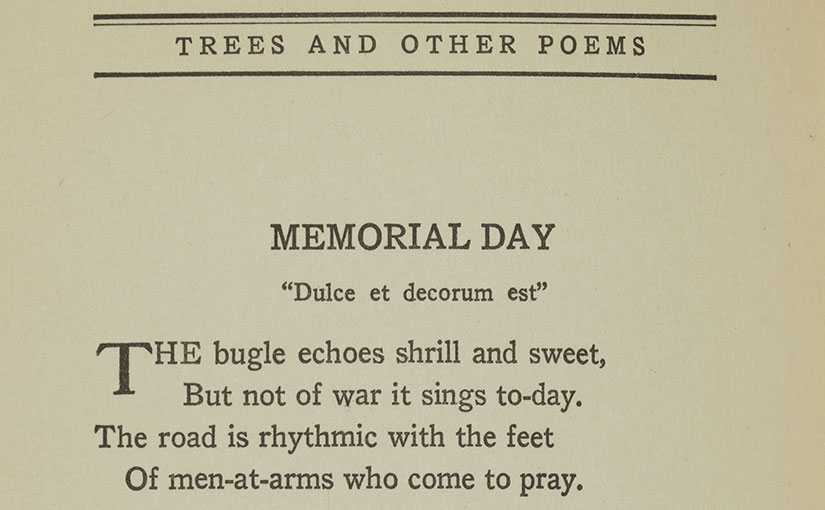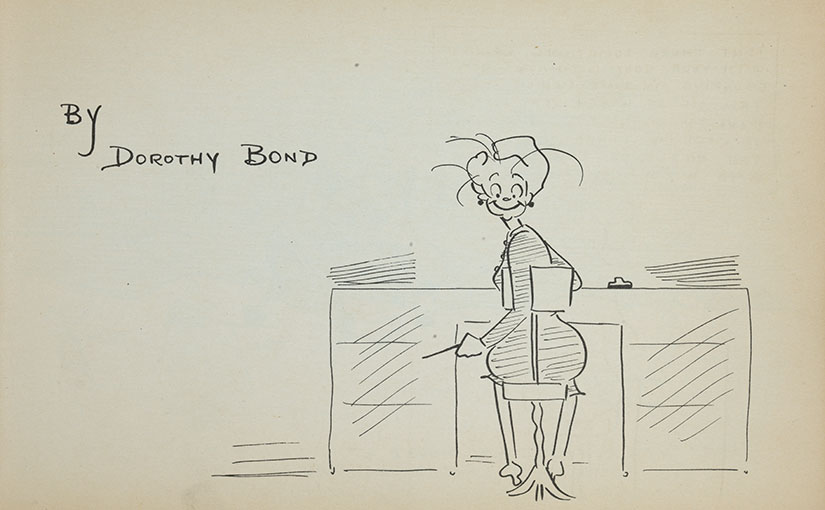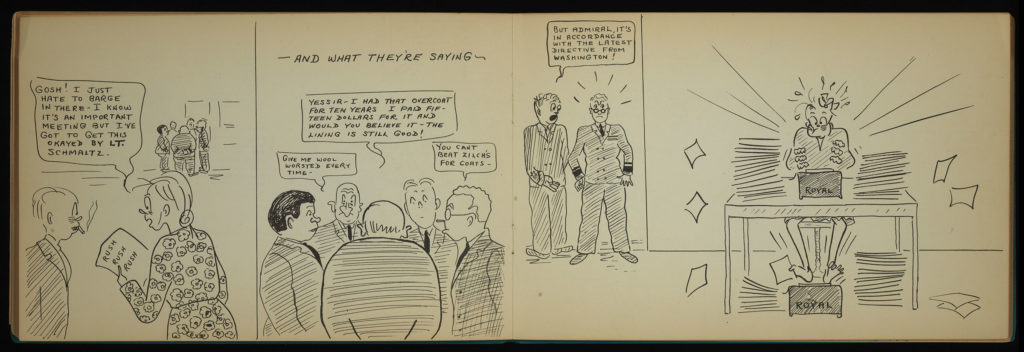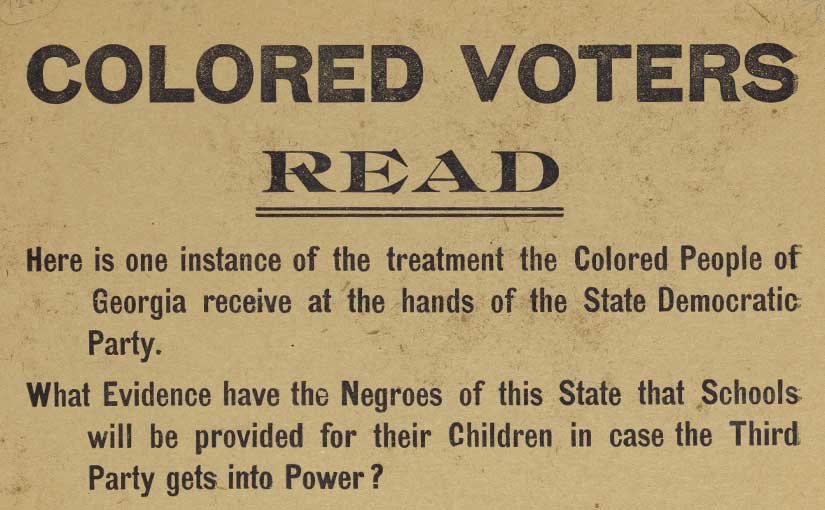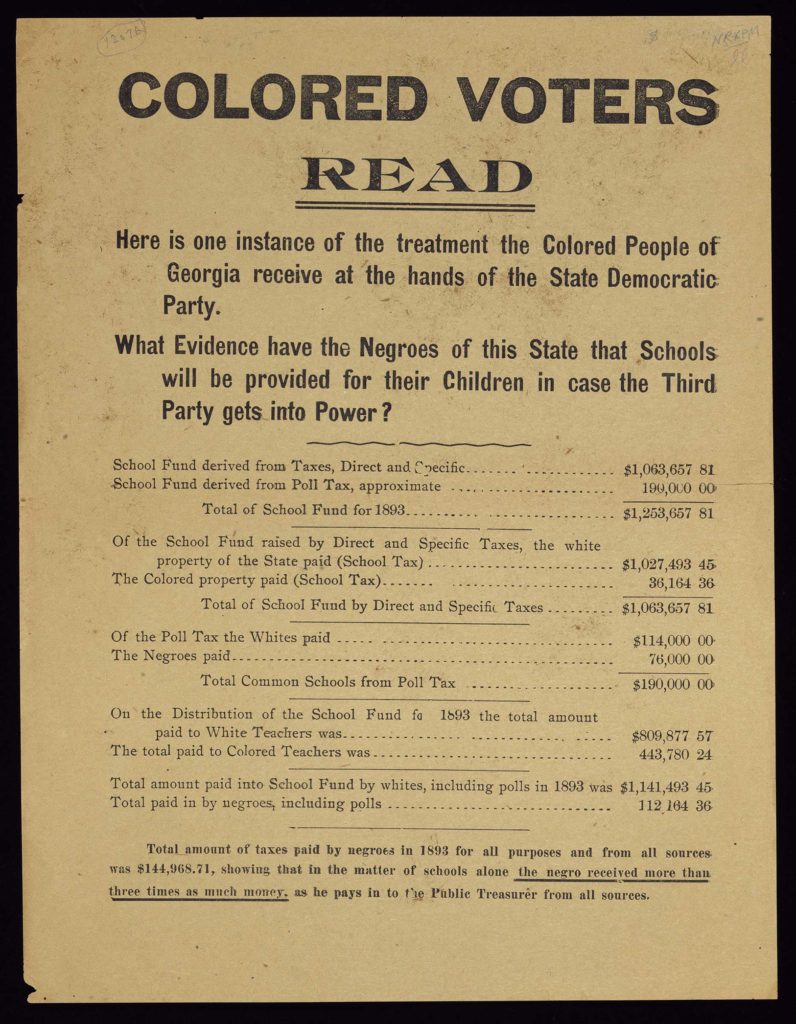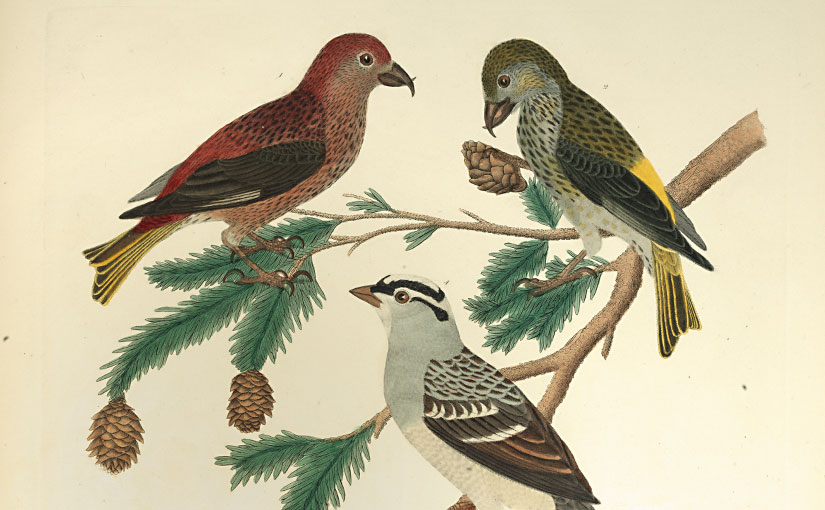Rare Books and Special Collections will be closed for Christmas and New Year’s Break beginning on December 22, 2017. We will reopen January 2, 2018.
Tag: on this day & holidays
Playing Indian, Playing White
by Rachel Bohlmann, American History Librarian
Last week’s blog post described an important collection about the Carlisle Indian School, a boarding school that was part of a federal educational program that opened many similar institutions and lasted through the twentieth century. Thanksgiving often evokes a benign story of starving New England Pilgrims saved by generous Native Americans. Records from the Carlisle Indian School, however, highlight a dark colonialist story of Pilgrims and Indians that the school asked its students to portray on stage.
By 1909 Carlisle students had begun performing a theatrical version Henry Wadsworth Longfellow’s poem, “The Courtship of Miles Standish,” as part of the school’s week-long commencement celebrations. The school staged the play for large public audiences at the school and in nearby Harrisburg, Pennsylvania.[1] Adapted as The Captain of Plymouth, it was a comic opera by Seymour S. Tibbals and Henry C. Eldridge, published in 1904.[2]
While the soldier Miles Standish and the Pilgrim John Alden are both interested in a young Pilgrim, Priscilla, Standish is captured by a band of Pequot Indians. The Pequot princess, Katonko, frees Standish on his promise to marry her. Standish quickly reneges on Katonko and takes bloody revenge on the Pequots. The story ends when the Pilgrim leader, Elder Brewster, discovers Standish’s breach of promise to Katonko and insists that Standish marry her, which allows Priscilla and Alden to wed.
The play is both silly (anachronistically, Standish refers to the Standard Oil Company, Rockefeller, and the anti-alcohol icon Carrie Nation) and deeply and openly racist. Katonko and Indians in general are characterized as “the very beginning, as it were, of the race problem” and the play advocates for racial segregation, a position seemingly at odds with the educational and social goals of Indian boarding schools like Carlisle, which worked to assimilate Native Americans into white America.[3]
The play capitalized on popular demand during the first decades of the twentieth century for entertainment featuring Indians. Presumably Tibbals and Eldridge intended whites to be cast in both the European American and Indian parts. Carlisle students, however, were required to play both roles: the young people cast as settlers had to act white, while those cast as Native Americans had to play white-constructed versions of savage Indians.[4]
Carlisle’s founder, Richard Henry Pratt, understood the promotional powers of photography and he used manipulated images to argue for the success of his program to “civilize” Indians. Using before-and-after photographs, Pratt contrasted the traditional clothing and hair styles of newly arrived children with the cropped hair, neat uniforms, and photographically lightened skin of new students.[5] When The Captain of Plymouth was staged, school officials continued to use Pratt’s methods to promote the school. As seen here, the carefully organized studio photographs of cast members enhanced the whiteness of Pilgrim cast members in contrast to their fellow actors who played Indians.
The Alfred W. Ramsey papers document a dark part of United States history and uncover what must have been bewildering experiences for young Native boarding students, far from their homes and families.
Notes:
[1] Louellyn White, “White Power and the Performance of Assimilation: Lincoln Institute and Carlisle School,” in Carlisle Indian Industrial School: Indigenous Histories, Memories, and Reclamation, Jacqueline Fear-Segal and Susan D. Rose, eds., (Lincoln: U of Nebraska Pr, 2016), 111.
[2] Seymour S. Tibbals and Harry C. Eldridge, The Captain of Plymouth, a Comic Opera in Three Acts. [Franklin, Ohio: Eldridge Entertainment House], 1904. Accessed on November 16, 2017: https://hdl.handle.net/2027/iau.31858047202639.
[3] Quotation from Tibbals and Eldridge, The Captain of Plymouth, 21. White, “White Power and the Performance of Assimilation,” 114-15.
[4] White, “White Power and the Performance of Assimilation,” 111-12.
[5] Jacqueline Fear-Segal and Susan D. Rose, “Introduction,” in Carlisle Indian Industrial School: Indigenous Histories, Memories, and Reclamation, Jacqueline Fear-Segal and Susan D. Rose, eds., (Lincoln: U of Nebraska Pr, 2016), 8-9.
This work is licensed under a Creative Commons Attribution 4.0 International License.
National Native American Heritage Month 2017
We join the Library of Congress, National Archives and Records Administration, National Endowment for the Humanities, National Gallery of Art, National Park Service, Smithsonian Institution, and United States Holocaust Memorial Museum in recognizing the rich histories and traditions of Native Americans during this National Native American Heritage Month.
Alfred W. Ramsey and the Carlisle Indian Industrial School
by George Rugg, Curator, Special Collections
In January 1909 Alfred W. Ramsey (1883-1955) accepted a provisional appointment as business teacher at the Carlisle Indian Industrial School in Carlisle, Pennsylvania. He was formally hired in March following a satisfactory result on his Civil Service examination. Ramsey was charged with organizing a business department at the school, to complement its trade and academic programs. He resigned his position effective 1 November 1910, apparently disillusioned with the Indian Service and the school.
The Carlisle Indian Industrial School was founded in 1879 by Captain Richard Henry Pratt, as part of a government project designed to “kill the Indian, save the man.” In Ramsey’s day it was overseen by the Office of Indian Affairs, Department of the Interior. Carlisle became the model for 25 government Indian schools, founded on the premise that Native Americans could be equal to European Americans, provided they assimilate into European American society and culture. While the school removed Native American children from poverty and provided them with a free education, it also encouraged children to abandon their native cultures.
The Alfred W. Ramsey Papers, acquired by RBSC in 2014, include a wealth of material from Ramsey’s time at Carlisle. Among the manuscripts are examples of student writing and typing exercises; copies of addresses by Carlisle administrators (especially superintendent Moses Friedman) and commencement speakers; school mission and policy statements; and essays on character and behavior with a bearing on Indian education. Some of this material would have been generated as a consequence of Ramsey’s teaching (including instruction in typing), but much of it was the result of his de facto status as clerical assistant to Friedman. There are also two memory books preserved by Ramsey, with questionnaires filled out in manuscript by 79 different Carlisle students.
The printed matter includes a broad selection of items from the Carlisle Indian Press; printing was one of the trades taught at the school, and Edgar Miller, the program’s superintendent, was a particular friend of Ramsey’s. Included are runs of school periodicals like the weekly The Carlisle Arrow and the monthly The Indian Craftsman (later titled The Red Man). There are also pamphlets, programs, broadsides, dance cards, and other ephemera.
Photographs include panoramas of the Carlisle campus and a number of group portraits of the student cast of the comic opera “The Captain of Plymouth”—the subject of next week’s blog.
A spooky story for Halloween: The Goblin Spider
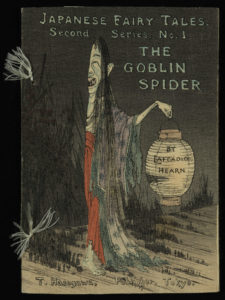 Ancient Japan, samurai warriors, and your casual spider—casual, that is, until nightfall. According to ancient Japanese legend, these ordinary spiders would morph as dark night enveloped the landscape. Menacing pincers, bulging eyes, and even taking on human form to deceive unsuspecting victims—like the samurai in the tale below—these goblin spiders wreaked terror.
Ancient Japan, samurai warriors, and your casual spider—casual, that is, until nightfall. According to ancient Japanese legend, these ordinary spiders would morph as dark night enveloped the landscape. Menacing pincers, bulging eyes, and even taking on human form to deceive unsuspecting victims—like the samurai in the tale below—these goblin spiders wreaked terror.
Lafcadio Hearn brings this ancient tale, one of many in the Japanese tradition of ghost stories known as kaidan, to English readers. The Goblin Spider is lavishly illustrated in Takejiro Hasegawa’s five-volume set of crepe-paper books. These brightly colored illustrations are hand-printed using wood blocks on textured pages.
Hearn, Lafcadio. The Goblin Spider. Kobunsha’s Japanese Fairy Tale Series. Second series. No. 1. Tokyo: T. Hasegawa, 1899.
Happy Halloween to you and yours from all of us in Notre Dame’s Special Collections!
Halloween 2016 RBSC post: Ghosts in the Stacks
National Hispanic Heritage Month 2017
We join the Library of Congress and the National Endowment for the Humanities, National Gallery of Art, National Park Service, Smithsonian Institution, United States Holocaust Memorial Museum and U.S. National Archives and Records Administration in celebrating National Hispanic Heritage Month.
Sergio Sánchez Santamaría
by Erika Hosselkus, Curator, Latin American Collections
Sergio Sánchez Santamaría is a printmaker, illustrator, and muralist who was born in Tlayacapan, Morelos, Mexico. Also trained in Mexico, Sánchez Santamaría has exhibited his work throughout Latin America and Europe, in the United States, and in Japan and China.
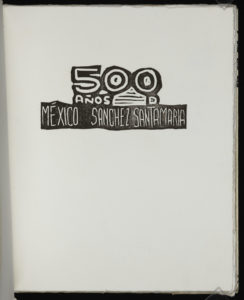
Among Sánchez Santamaría’s collections of linocut prints is a small volume called 500 años, México, printed at the San Jerónimo workshop in Tlayacapan. The 14 impressions comprising this piece offer a visual history of Mexico, from the age of the Mexica (Aztecs) to the late twentieth century. A jaguar and feathered serpent are among the engravings representing the nation’s indigenous past. Also portrayed are major figures historical figures such as national hero and president, Benito Juárez (in office 1858-1872), and the best-known female intellectual of the colonial era, Sor Juana Inés de la Cruz.
Rare Books and Special Collections holds the second of the six copies of 500 años, México produced by Sánchez Santamaría. Depicted here are two images from this copy.
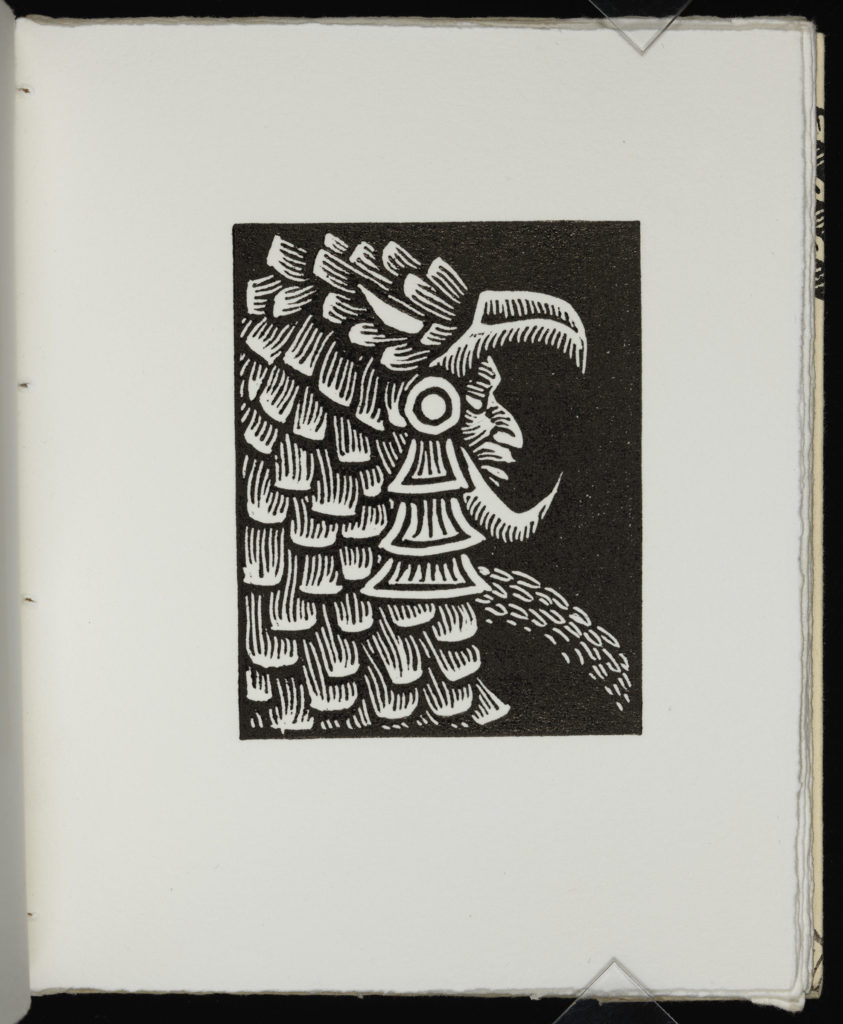
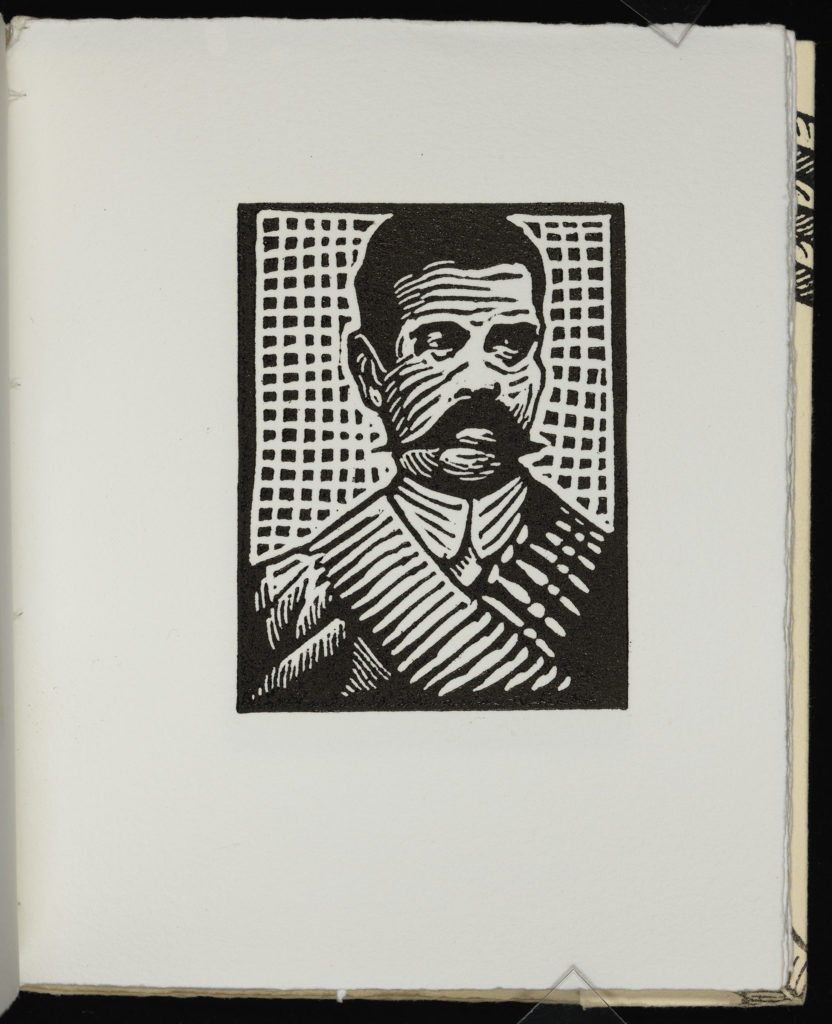
Both prints illustrate the deep relief and heavy ink on cartridge paper characteristic of Sánchez Santamaría’s work. The style and the subject matter of his work tie him to the Taller de Gráfica Popular, a well-known artists’ print collective formed in 1937 that produced artwork designed to promote and advance the causes of the Mexican Revolution.
Sánchez Santamaría’s work often treats topics in Mexican history and popular culture. In 2016 he released a series of linocuts entitled Personajes de Morelos depicting figures central to the history of his home state. This collection was also printed in Tlayacapan. Rare Books and Special Collections holds copy fourteen of this collection, along with an actual linocut created by Sánchez Santamaría, shown below.
This image and linocut – number fourteen within this collection – depicts Zapatista colonel, Cristino Santamaría. According to Sánchez Santamaría, Cristino Santamaría, a musician and leader of the Banda Brigido Santamaría, fought alongside Emiliano Zapata during the Mexican Revolution. Santamaría’s face is obscured by his oversize sombrero, from under which his trumpet emerges. He is flanked by two figures wrapped tightly in traditional serapes. The print’s heavy lines contrast boldly with the white cartridge paper background.
Close examination of the linocut reveals something of Sánchez Santamaría’s technique. Cuts are of varying depth, to achieve different sorts of impressions. Outlines of the figures and blue pen shading can also be discerned.
Along with these two collections, Rare Books and Special Collections holds copies of: “Los chinelos,” a series of 11 linocuts featuring “chinelos,” the masked, bearded figures that feature prominently in festivals in Morelos, especially Carnival; Cuaresma en la region Cuautla Morelos, a collection of Easter-related prints, and; Kamasutra de exlibris mexicanos.
This work is licensed under a Creative Commons Attribution 4.0 International License.
A Ga-lorious 4th of July
by Sara Quashnie, M.L.I.S. Candidate, University of Illinois, Urbana-Champaign, and Rachel Bohlmann, American History Librarian
In this print, “Ye two Ga-lorious 4ths,” a Civil War soldier playfully and ironically compared Independence Day observations in 1861 and 1862. Drawing upon his own military experience, the artist compared the way he (and perhaps how he believed his family and friends) idealized military service with the grim realities of army life.
Henry Bacon, the young soldier who created the sketches in this lithograph, enlisted in the 13th Massachusetts Regiment of the United States Army a few weeks after July 4, 1861. Severely wounded at the Second Battle of Bull Run, he was discharged on December 19, 1862.
While in the army Bacon sold drawings to Frank Leslie’s Weekly Illustrated Newspaper, a popular publication in the North that fed the public’s voracious appetite for war news including, for the first time, images.
In seven paired images, Bacon mocked his own (and others’) illusions about wartime military service and perhaps also the experience of peacetime service. In “Ye Escort” and “Ye Patriot,” Bacon poked gentle fun at the toy-soldier appearance of a peacetime soldier on escort duty in contrast to the practical, informal, and even patchwork attire of an active soldier “Patriot.”
In a pairing that evoked Independence Day by mentioning “Fire Works,” Bacon contrasted the lofty ideals of “Liberty and Union” (references to ending slavery and secession) with a prosaic military camp fire. He also included an ironic note comparing viewing fireworks with the experience of facing artillery fire. Another pairing, between “Ye Bewildering Vision” and “Ye ‘Rational’ Reality,” compared a copy of the Declaration of Independence placed upon a richly laden table, with torn and battered “Marching Orders” on the ground beside spartan military rations of “hard bread,” and a canteen of water. Noble rhetoric about saving the Union complemented Independence Day celebrations, but it contrasted starkly with the hardships of military life.
After his discharge Bacon moved to France to study painting and remained in Europe for the rest of his life.
 This work is licensed under a Creative Commons Attribution 4.0 International License.
This work is licensed under a Creative Commons Attribution 4.0 International License.
Memorial Day
To honor all who died while serving in the United States Armed Forces.
Memorial Day, originally celebrated as Decoration Day, began after the Civil War. John A. Logan, a general in the Union Army and Commander-in-Chief of the Grand Army of the Republic, a fraternal organization of Civil War veterans, issued General Orders No. 11. Logan designated that the graves of those who died fighting to defend their country be decorated on May 30, 1868. Almost 100 years to the day later, President Lyndon B. Johnson signed into law, Public Law 90-363, the Uniform Holiday Bill, establishing the official observance of Memorial Day as the last Monday in May.
Joyce Kilmer (1886-1918), an American journalist and poet from New Brunswick, New Jersey, served in the 69th Infantry Regiment of the New York Army National Guard during the First World War. He fell victim to a sniper’s bullet during the Second Battle of the Marne on July 30, 1918. His poem, “Memorial Day,” appeared in his second volume of poetry, Trees and Other Poems, published in 1914 by George H. Doran and Company.
Women’s History Month: A Woman’s Sardonic Eye
by Rachel Bohlmann, American History Librarian
To honor Women’s History Month we are highlighting a new acquisition by a cartoonist who turned her sardonic eye on women and men in the WWII workplace.
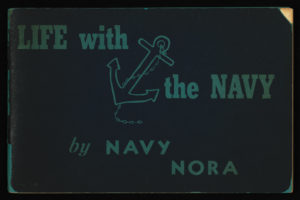 Dorothy Bond drew on her working life in Chicago offices to create sarcastic, witty cartoons, which she turned into nationally syndicated comic strips after WWII. In 1940 Bond, a divorced mother of two, began working as the civilian executive secretary for a Rear Admiral in the United States Navy. The result was this self-published Life with the Navy by Navy Nora, a wry, biting, and affectionate look at office life during wartime. Bond dedicated it to “those unsung heroes and heroines who work in shore establishments for the finest Navy in the world – the United States Navy.”
Dorothy Bond drew on her working life in Chicago offices to create sarcastic, witty cartoons, which she turned into nationally syndicated comic strips after WWII. In 1940 Bond, a divorced mother of two, began working as the civilian executive secretary for a Rear Admiral in the United States Navy. The result was this self-published Life with the Navy by Navy Nora, a wry, biting, and affectionate look at office life during wartime. Bond dedicated it to “those unsung heroes and heroines who work in shore establishments for the finest Navy in the world – the United States Navy.”
In one cartoon (seen here), Bond mocked male self-importance and tweaked gender expectations by portraying a female secretary’s hesitation to interrupt a group of men in conversation. While she delayed, Bond revealed the men’s mundane discussion—about clothes (where to buy the cheapest, best-quality overcoats). In the panel opposite Bond caricatured the government’s wartime production expectations and the gendered labor market it exploited. While the young woman secretary doubled down, using two typewriters simultaneously, her male superiors merely observed and rationalized her work speed-up.
Bond made a career of capturing, in drawings and words, the absurdities and gender politics in American offices. After publishing two more cartoon books about women and office work, she became a nationally syndicated cartoonist with a daily panel called The Ladies in 1945. From this success Bond created a comic strip that she dedicated to secretaries, Chlorine, Champion of the Working Girl. Her post-war office humor included cartoons like, “Whatever It Is, No!” and “Out Looking for a Man. Back at ___.” Bond continued to publish cartoon books on timely post-war topics like Life with the Boss (1947) and Your First or Second Baby? (1956), and later in her career, broke into advertising.
 This work is licensed under a Creative Commons Attribution 4.0 International License.
This work is licensed under a Creative Commons Attribution 4.0 International License.
African American History Month
“Paying tribute to the generations of African Americans who struggled with adversity to achieve full citizenship in American society” – We join the Library of Congress, National Archives and Records Administration, National Endowment for the Humanities, National Gallery of Art, National Park Service, Smithsonian Institution, and United States Holocaust Museum to observe African American History Month.
African Americans and Populism
by Rachel Bohlmann, American History Librarian
In this 1894 poster, the Democratic Party of Georgia felt the warm breath of third party competition on the back of its neck. The unnamed “Third Party” was the People’s Party of the United States, also known as the Populists.
The Populists were established in 1892 by a coalition of famers in the South and Midwestern plains states who believed that eastern banks and railroads, supported by government policies, exploited them with expensive credit and transportation. They were joined by industrial workers who criticized the major parties for being controlled by corporate and financial elites. In the 1892 election Populists won three governorships and 15 Congressional seats. It was the period’s most significant political insurgency.
In Georgia, the Populist wave had captured the allegiance of so many white Democrats by 1894 that the balance of political power had shifted to African Americans. If they swung their support from the minority Republican Party to the People’s Party, Democrats would lose control.
Panicked Democrats cravenly released broadsides like this one, which attempted to browbeat African American voters away from the People’s Party by threatening less public support for their children’s education. Despite such heavy-handed tactics, many African American farmers in Georgia supported Populism, as black farmers did across the South.
Georgia Democrats grimly hung onto power by mobilizing white voters against “Negro supremacy,” intimidating black voters, and outright vote fraud. Although Populism’s appeal had increased in rural states like Georgia in 1894, nationally the party lost ground. By the 1896 presidential election, the Democratic Party shrewdly absorbed part of the Populist’s platform and the agrarian revolt was checked.
Special Collections invites everyone to visit during African American History month to view or conduct research on materials such as the 1894 poster featured above. For more information, please contact us.
 This work is licensed under a Creative Commons Attribution 4.0 International License.
This work is licensed under a Creative Commons Attribution 4.0 International License.
Happy Holidays from Special Collections!
Rare Books and Special Collections will be closed for Christmas and New Year’s Break beginning on December 23, 2016. We will reopen January 3, 2017.
